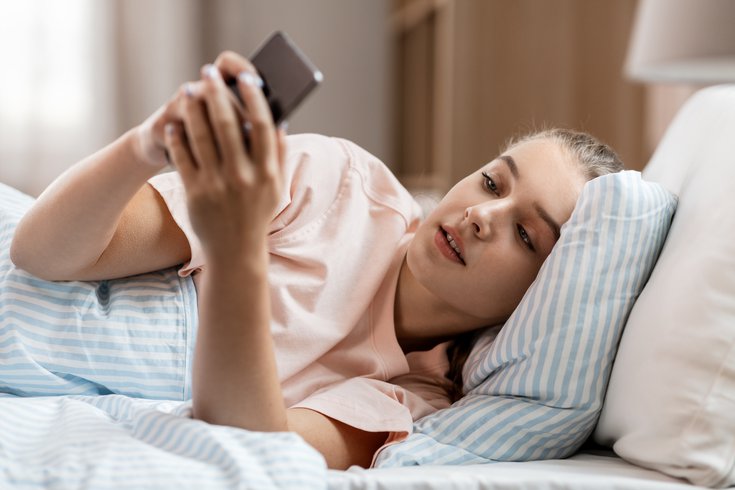
September 16, 2022
 Source/Image licensed from Ingram Image
Source/Image licensed from Ingram Image
A new study found teens who used YouTube delayed going to bed by 11 minutes and falling asleep by 13 minutes, on average. That was far more disruptive than other apps.
It's no secret at this point that smartphones are linked to a variety of adverse effects, including poor sleep habits. But the latest research suggests one app is particular is likely to keep teenagers up at night.
For every 15 minutes teenagers spent watching YouTube in bed, they were 24% less likely of getting 7 hours of sleep, a new study found. By contrast, those who watched the same amount of television went to bed nine minutes earlier. <
The researchers, from Australia, also examined the effects of six other apps, including Instagram, Snapchat and Spotify. None of those apps consistently or negatively impact teens' sleep habits. But using gaming consoles also was associated with a lack of adequate sleep and watching Netflix was linked to greater daytime sleepiness.
YouTube may be more disruptive than other apps because its videos are short and feature recommendations that make it easy to keep watching, sleep experts say. In the study, adolescents who used YouTube delayed going to bed by 11 minutes and falling asleep by 13 minutes, on average.
"We've been seeing teenagers who have sleep problems in our clinic," researcher Michael Gradisar, head of sleep science at Sleep Cycle in Adelaide, Australia, told U.S. News & World Report. "A lot of them have tried refraining from using technology, and clearly that hasn't worked for them. Many of them mentioned that they would watch YouTube as they try to fall asleep. They find it entertaining without it being overly stimulating."
The study of 711 adolescents, ages 12 to 18, did not examine the impact of TikTok, an increasingly popular social media platform that features quick short videos. But other studies have found the platform worsens sleep and is more likely to leave users feeling tired during the day, the Daily Mail reported.
One of the more surprising findings was that teens who watched TV before bedtime went to bed earlier. This seems to contradict earlier research that stressed the importance of keeping TVs out of bedrooms.
But teens don't interact with TVs in the same way they do other electronic devices, including laptops and tablets, which are easier to use in bed, Gradisar said.
According to the Pew Research Center, 95% of children ages 13 to 17 say they use YouTube, and 19% say they use YouTube almost constantly.
But research has shown that other forms of technology affects sleep quality and duration. The blue light that smartphones emit can affect circadian rhythms, according to the Sleep Foundation. It makes the body more alert, deceiving the body into thinking it's daytime. Alerts and notifications also can disrupt slumber.
Screen time also has been linked to insomnia, though there is debate about whether it's a causal relationship or that teens who have trouble sleeping are more likely to turn to their phones at night.
Teenagers need 8 to 10 hours of consistent sleep to support the major mental, physical, social,and emotional development they go through during this phase of life, according to The Sleep Foundation and the American Academy of Sleep Medicine.
But what complicates matters is that, during the teen years, there is a delay in the circadian phase of sleeping and waking. Because of this, teens tend to go to bed late and wake up late, which is hard to do on school days with early start times.
This natural physiological phase, coupled with the distractions from electronic devices, can make it that much harder for teens to get the amount and quality of sleep they need to be healthy. Most teens regularly operate on some type of sleep deficit, according to the Better Health Channel.
Sleep deprivation in teens has been shown to increase their risk of depression, anxiety, bipolar disorder and suicide. It also affects their cognitive skills and performance in school, and could lead to risky behaviors such as drunk driving and texting while driving.
A clinical psychologist at Tel Aviv University, Dr. Avi Sadeh, has reported a significant performance gap between sleep- deprived and well-rested students. Just getting one less hour of sleep per night for three nights in a row causes a slide in cognitive performance by as much as two grade levels.
Some researchers have found that teens who fail to get enough sleep are at higher risk of metabolic conditions such as diabetes and cardiovascular disease.
The 2011 Sleep in America Poll from the National Sleep Foundation found that roughly 4 in 10 Americans bring their cell phones to bed when trying to fall asleep. This behavior was especially common among adolescents and young adults. Other studies have found the use of mobile phones, social media, computers and television is associated with short sleep duration.
Sleep experts say that teenagers can improve their sleep hygiene by building eight hours of sleep into their daily schedules, including the weekend, and consistently following a bedtime routine that helps with relaxation and falling asleep. They should put all electronic devices away at least a 30 minutes before bed and keep them on silent mode to avoid alerts in the middle of the night.
Setting up teens' bedrooms with supportive mattresses and pillows also can help. So can keeping bedrooms cool, dark and quiet at night.